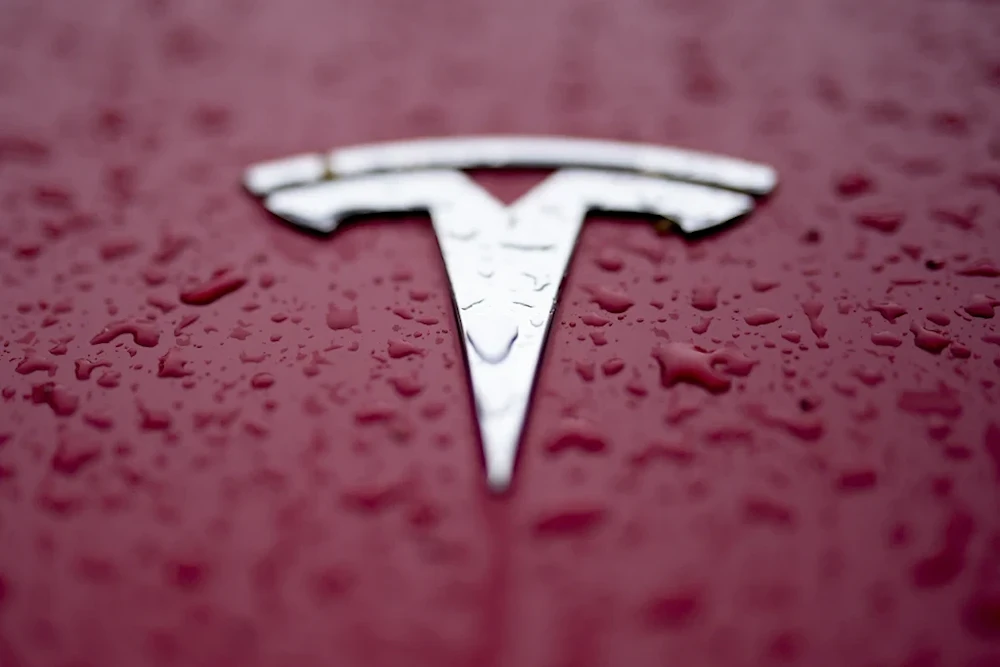Musk promised robotaxis with returned leases, Tesla sold them instead
Tesla prohibited US customers from buying leased vehicles, claiming they would serve in its robotaxi fleet. Instead, Tesla resold upgraded used cars for profit, raising questions about transparency and Elon Musk’s long-standing promises.
-

A Tesla logo is shown on February 27, 2024, in Charlotte, NC. (AP/Chris Carlson)
Tesla's long-standing lease policy, which denied US customers the ability to purchase their vehicles at the end of lease terms, has now come under fire.
According to Reuters, the company originally justified the restriction by claiming that returned vehicles were earmarked for its future robotaxi fleet.
The policy, implemented in 2019 alongside the launch of the Model 3 leasing program, was introduced with bold promises from Tesla CEO Elon Musk, according to Reuters. Speaking at an investor event in California, Musk declared, “You don’t have the option of buying. We want them back,” and predicted that “next year, for sure, we’ll have over 1 million robotaxis on the road.”
That promise never materialized.
Despite repeated assurances about autonomous fleets, Tesla never deployed robotaxis. Instead, according to Reuters, which cited four individuals familiar with Tesla’s retail operations, the company quietly resold many of the returned cars, often at elevated prices after applying software upgrades.
'Jacking up prices'
Rather than allowing lessees to buy their vehicles, a standard industry option, Tesla added features like Full Self-Driving (sold separately for up to $15,000) and an acceleration boost ($2,000), before reselling the vehicles, according to Reuters. These add-ons allowed the company to increase resale value significantly beyond what lease customers would have paid at buyout.
Robotaxi & Robovan pic.twitter.com/pI2neyJBSL
— Tesla (@Tesla) October 11, 2024
One source described the practice as an easy way to “jack up the price” of a depreciating asset without the storage risks associated with used inventory.
Software upgrades pushed resale prices higher
Tesla’s approach ran counter to both its public statements and the vehicle lease terms published on its own website, yet it remained legally permissible. However, for lessees who believed their cars would serve in an autonomous fleet, the shift felt misleading, said Reuters.
Former lessee Joe Mendenhall shared his experience online, stating that Tesla staff had informed him the vehicle would be kept for the robotaxi program, only to discover later that it was auctioned. “Lies about not being able to buy out my lease,” he wrote on Musk’s platform X. “The car gets sold at auction, not turned into a robotaxi like I was told.”
The backlash highlights growing concerns among customers who believed they were contributing to Tesla's transformative mobility initiative, only to learn their returned vehicles were part of a Tesla resale strategy.
Investor myths and the robotaxi narrative
Tesla’s story about reserving off-lease vehicles for robotaxis aligned with a larger narrative that helped increase investor confidence in its long-term ambitions, according to Reuters. Since 2016, Musk has repeatedly promised that Tesla’s vehicles would be fully autonomous “next year.” Analysts from Ark Investment Management, long bullish on Tesla stock, even cited the off-lease inventory as a potential base fleet for a future ride-hailing service.
But skepticism has persisted, according to Reuters. At the time of Tesla’s 2019 robotaxi announcement, analysts at Evercore ISI responded with incredulity, writing in a research note: “uhmmm, what??” They cautioned that the plan was far from viable within the stated timeline.
Tesla reverses policy amid falling used car demand
The lease buyout ban, initially suited to a pandemic-era market with tight inventories and high prices, became less sustainable as Tesla's resale value declined. Used Tesla prices have dropped significantly; the Model Y alone lost 14.1% of its value in the past year, while the Cybertruck saw a 46% plunge, according to CarGurus data. In comparison, the average price decline across all brands was just 0.8%, reported Reuters.
Faced with mounting depreciation and weakening demand, partly due to backlash over Musk’s political positioning, Tesla reversed course. On November 27, the company posted a statement on X announcing, “Lease buyout now available.” Its website now confirms that some leased vehicles “may be eligible for purchase.”
Industry analysts say the reversal likely reflects an effort to avoid “being caught holding the bag,” according to Reuters. Tesla's CFO Vaibhav Taneja recently cited “lower profit from used car business” as a factor contributing to declining margins.
Disillusioned customers push back
For many former lessees, the abrupt turn came too late. Marshall Distel, who leased a Model 3 in 2023, said he understood that buyouts were not allowed, and he initially accepted that. But now, citing Musk’s public stances and political ties, he says he would no longer support the company, “I love the car, I just don’t like what has been going on at the top with the CEO. I don’t want to be associated with that anymore.”
As Tesla faces growing competition in the electric vehicle sector and rising consumer skepticism, the gap between its ambitious narratives and operational realities continues to draw criticism, with the Tesla lease buyout scandal now serving as a symbol of that disconnect.

 5 Min Read
5 Min Read








